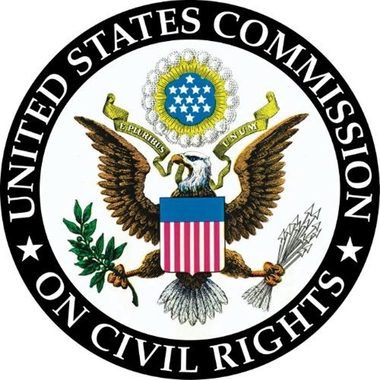US Commission on Civil Rights statement on anti-LGBT legislation

The United States Commission on Civil Rights strongly condemns recent state laws passed, and proposals being considered, under the guise of so-called “religious liberty” which target members of the lesbian, gay, bisexual, and transgender (“LGBT”) community for discrimination.
North Carolina Governor Pat McCrory recently signed into law H.B. 2, legislation blocking local governments from passing anti-discrimination rules that grant protections to gay and transgender persons. The law also repeals existing municipal anti-discrimination laws which protected LGBT people from bias in housing and employment. Critically, the new legislation also forces transgender people to utilize public bathrooms and changing facilities based on the sex issued on their birth certificates, and not according to their gender identities. This jeopardizes not only the dignity, but also the actual physical safety, of transgender people whose appearances may not match societal expectations of the sex specified on their identification documents.
In Mississippi, Governor Phil Bryant recently signed HB 1523 into law. The new statute is far- reaching and allows people with “religious objections” to deny wedding services to same-sex couples. It also clears the way for employers to cite religion in determining workplace policies on dress code, grooming and bathroom access. The physical safety concerns for transgender people are the same as in North Carolina.
The laws enacted in North Carolina and Mississippi are not isolated, but are part of a larger, alarming trend to limit the civil rights of a class of people using religious beliefs as the excuse. Similar laws were passed by the legislatures in Georgia and Virginia, but those were vetoed after significant public pressure. The Tennessee legislature just passed a bill which, if signed by Governor Bill Haslam, will permit mental health professionals to deny counseling services to LGBT people based upon “sincerely held religious beliefs.” Kansas is considering a nonlegislative, administrative policy change which would make it more difficult for transgender people to change the sex listed on their birth certificates. These laws and policies can be found to violate the Equal Protection and Due Process clauses of the Fourteenth Amendment. These laws can also be found to violate Title IX of the Education Amendments of 1972, which forbids discrimination against transgender students in any school that receives federal funding.
The Commission recently approved a report, which will be released shortly, on the issue of religious liberty. In our findings and recommendations the Commission makes clear:
• Civil rights protections ensuring nondiscrimination, as embodied in the Constitution, laws, and policies, are of preeminent importance in American jurisprudence.
• Religious exemptions to the protections of civil rights based upon classifications such as race, color, national origin, sex, disability status, sexual orientation, and gender identity, when they are permissible, significantly infringe upon these civil rights.
• Overly broad religious exemptions unduly burden nondiscrimination laws and policies. Federal and state courts, lawmakers, and policy-makers at every level must tailor religious exceptions to civil liberties and civil rights protections as narrowly as applicable law requires.
Commission Chairman Martin R. Castro stated on behalf of the Commission, “Religious freedom is an important foundation of our nation. However, in the past, ‘religious liberty’ has been used to block racial integration and anti-discrimination laws. Those past efforts failed and this new attempt to revive an old evasive tactic should be rejected as well. The North Carolina and Mississippi laws, and similar legislation proposed in other states, perverts the meaning of religious liberty and perpetuates homophobia, transphobia, marginalizes the transgender and gay community and has no place in our society.
The U.S. Commission on Civil Rights is an independent, bipartisan agency charged with advising the President and Congress on civil rights matters and issuing a federal civil rights enforcement report. For information about Commission’s reports and meetings, visit http://www.usccr.gov.
The Gayly – April 19, 2016 @ 8:40 a.m.





